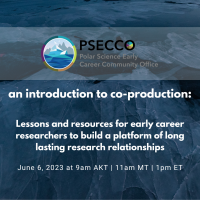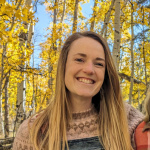Recording available: An Introduction to Co-production: Lessons and resources for early career researchers to build a platform of long-lasting research relationships

On June 6, 2023, PSECCO hosted a panel discussion entitled 'An Introduction to Co-production: Lessons and resources for early career researchers to build a platform of long-lasting research relationships' featuring an incredible panel of experts on the topic (named below), with the discussion moderated by Natasha Haycock-Chavez. The full recording for the event can be found on the CIRES Education and Outreach YouTube channel, and here:
Co-production of knowledge in Arctic research brings together multiple ways of knowing and emphasizes equity in research. This discussion panel provides an introduction to co-production of knowledge with an emphasis on providing tips and resources for early career researchers. Four co-production experts, Dr. Julia Christensen, Dr. Margaret Rudolf, Dr. Noor Johnson, and Dr. Stanislav Saas Ksenofontov were asked questions to introduce the concept of co-production, discuss ways in which early career researchers can approach co-production in Arctic research, and share lessons about long-term relationship building. In the last half hour of the panel there was an open Q&A between the panelists and those in attendance.
Panelists for the event included:
Julia Christensen
Julia Christensen (she/her) is an Associate Professor in Geography and Planning at Queen's University. She also leads 'At Home in the North', a research partnership on northern housing and home in partnership with northern and Indigenous communities from across northern Canada. Julia works largely in collaboration with northern and Indigenous research partners and has written extensively on lived experiences of Indigenous home and homelessness, housing insecurity and community-led housing.
Margaret Rudolf
Margaret Rudolf is finishing her interdisciplinary Ph.D. on co-production of knowledge at the University of Alaska Fairbanks. Her research focused on developing a culturally-responsive methodology, perspectives of success, and the roles of boundary spanners.
Noor Johnson
Noor Johnson is a research scientist at NSIDC. At NSIDC, she leads several international networks that support community-driven research on environmental change, Indigeous Knowledge documentation and co-production of knowledge, and food security and sovereignty. As PI and lead for the Exchange for Local Observations and Knowledge of the Arctic (ELOKA), she provides data management and user support to Arctic Indigenous communities and researchers spearheading research projects on environmental change, cultural knowledge transmission, and language preservation. Johnson is part of the leadership team (co-PI and social sciences lead) of the Navigating the New Arctic Community Office (NNA-CO), where she develops programming to support ethical data management and co-production of knowledge approaches within the Arctic research community. Johnson has previously conducted research in northern Canada on environmental knowledge production and mobilization and social and environmental justice issues in contemporary environmental governance. Prior to joining NSIDC, Johnson served as a science policy advisor to the Smithsonian Institution, and has served as a science policy consultant to a number of Indigenous and non-profit organizations.
Stanislav Saas Ksenofontov
Dr. Stanislav Saas Ksenofontov is an Indigenous Sakha social scientist from the Sakha Republic in Eastern Siberia, Russia. In his research, Stanislav focuses on the vulnerability of Arctic Indigenous social-ecological systems to global change drivers, namely climate change, industrial development, socio-political transformations. Other research interests include Arctic sustainable communities, Arctic urbanization, Indigenous identities, Russian energy megaprojects, Asian stakes in the Arctic. Dr. Ksenofontov holds a Ph.D. in Human Geography from the University of Zurich, Switzerland. Currently, he is a postdoctoral scholar at the ARCTICenter, University of Northern Iowa, USA. Besides research, Stanislav serves as a Fellowship Coordinator at the International Arctic Science Committee (Iceland).
There were multiple fantastic notes, resources and links shared in the chat during the event including:
- Indigenous Foods Knowledges Network: https://ifkn.org
- Exchange for Local Observations and Knowledge of the Arctic: https://eloka-arctic.org
- Principles for knowledge co-production in sustainability research
- A framework for co-production of knowledge in the context of Arctic research
- At Home in the North: https://athomeinthenorth.org
- A note/resource from Saas: "The best paper I came across recently https://link.springer.com/article/10.1007/s10113-022-01967-3 on building relationships with Sami reindeer herders"
- A note/resource from Margaret: "This paper on undisciplinarity has been really foundational in how I approach doing research and my Ph.D. https://link.springer.com/article/10.1007/s11625-017-0445-1"
- Alaska Humanities Forum facilitation: https://www.akhf.org/programs/facilitation-labs-workshops
- A note/resources from Saas: "My top books/papers on co-production: An Arctic Indigenous Knowledge System by Alexandra Lavrillier, All our relations by Winona LaDuke, Braiding sweetgrass by Robin Kimmerer
Thank you to the panelists for sharing their time an expertise and thank you to those who attended. We encourage you to share this wonderful introduction to co-production of knowledge discussion with anyone you think may find it useful!
Finally, we welcome you to join the PSECCO Community, if you aren't connect with it already! You can do so by subscribing to monthly newsletters with opportunities, engage with the community Slack space, or join the PSECCO listserv all specifically created for polar early career scientists: https://psecco.org/join-psecco-community.
Have a great summer!
